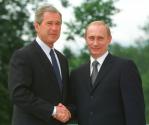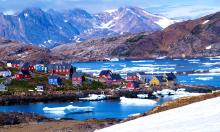USA has been using Russia for egocentric purposes for 13 years
Urging Russia to take the pro-Western stance inevitably implies the collapse of Putin's regime
One has to acknowledge that the USA and Russia differ a lot as far as their attitudes to major international issues are concerned. The two countries hardly have anything in common at this point. It is not ruled out that the dialogue might soon take the “cold war” style, unless Russian and American politicians learn to show mutual respect to each other. Russia and the USA need to turn down the double standards policy in order to be able to continue the cooperation, at least sporadically. 
Here is a short list of what George W. Bush's administration dislikes about Putin's Russia. President Putin regrets the break-up of the USSR. Putin prevents the USA from “promoting freedom” on the post-Soviet space. Putin is not willing to join the Western perception of freedom and democracy, trying to adjust this concept to the Russian reality. Putin approves arms deliveries to anti-American regimes (nuclear technologies to Iran, missiles to Syria, Kalashnikov guns and helicopters to Venezuela). Russia does not participate in the anti-Hussein coalition and joins France and Germany in their disapproval of the US-led campaign in Iraq. To crown it all, the US administration protests against the process of the Yukos case in Russia.
When Condoleezza Rice gave a friendly piece of advice to her Russian colleague, Sergey Lavrov, not to put obstacles on Belarus's way in its quest for freedom and democracy, Ms. Rice heard quite a harsh statement in return - to leave Belarus alone.
It is noteworthy that several members of the US Congress asked Russia to acknowledge the illegal occupation of Lithuania, Latvia and Estonia on the threshold of the 60th Anniversary of Victory over Nazism. It brings up the idea that the USA stands alongside with those, who dooms the Russian-speaking population in the Baltic states to semi-genocidal existence.
The USA's aggressive strategy has become evident already. NATO continues deploying its army bases around Russia, urging the Russian administration to close military bases in the Transdniestr region and in the former post-Soviet republic of Georgia. It goes without saying that Russia needs to abide by its obligations within the scope of decisions made at the Istanbul summit. On the other hand, it would be good for the North Atlantic Alliance not to build its bases in former Soviet republics too, in Azerbaijan and Kazakhstan, for instance. Once the USA establishes control over Eurasia, Russia's Ural and Siberian regions will find themselves unprotected. In addition, refugees from Central Asia (Muslims) might inundate Russia on account of NATO's presence in the region. The US-led “humanitarian intervention” is likely to become “virus-infected freedom.”
US Congressman Curt Weldon acknowledged, for example, that the USA has been using Russia for its purposes for 13 years already. It goes without saying that the USA can not come to terms with the “Russian empire” in its promotion of the single-polar world order. The Russian Federation, in its turn, does not at all wish to be a raw materials-producing appendage for the USA either. Russian and American politicians are standing on the line, which separates them from another cold war period. One may say that both Russia and the USA are following the preventive strategy of expectation, the strategy of containment, affecting each other with the help of indirect actions.
Urging Russia to take the pro-Western stance inevitably implies the collapse of Putin's regime in the country. Civil wars would tear Russia to pieces, and American interests would turn to might-have-been hopes.
One could probably refer to Henry Kissinger's formula in order to ease the tense relationship between the two superpowers: Russia and the USA can follow parallel courses in their policies, being at a certain distance from each other. The new quality of relations needs genuine truth and sincere respect to the interests of the true national security of both Russia and the United States of America.
Yevgeny Vertlib
Subscribe to Pravda.Ru Telegram channel, Facebook, RSS!




